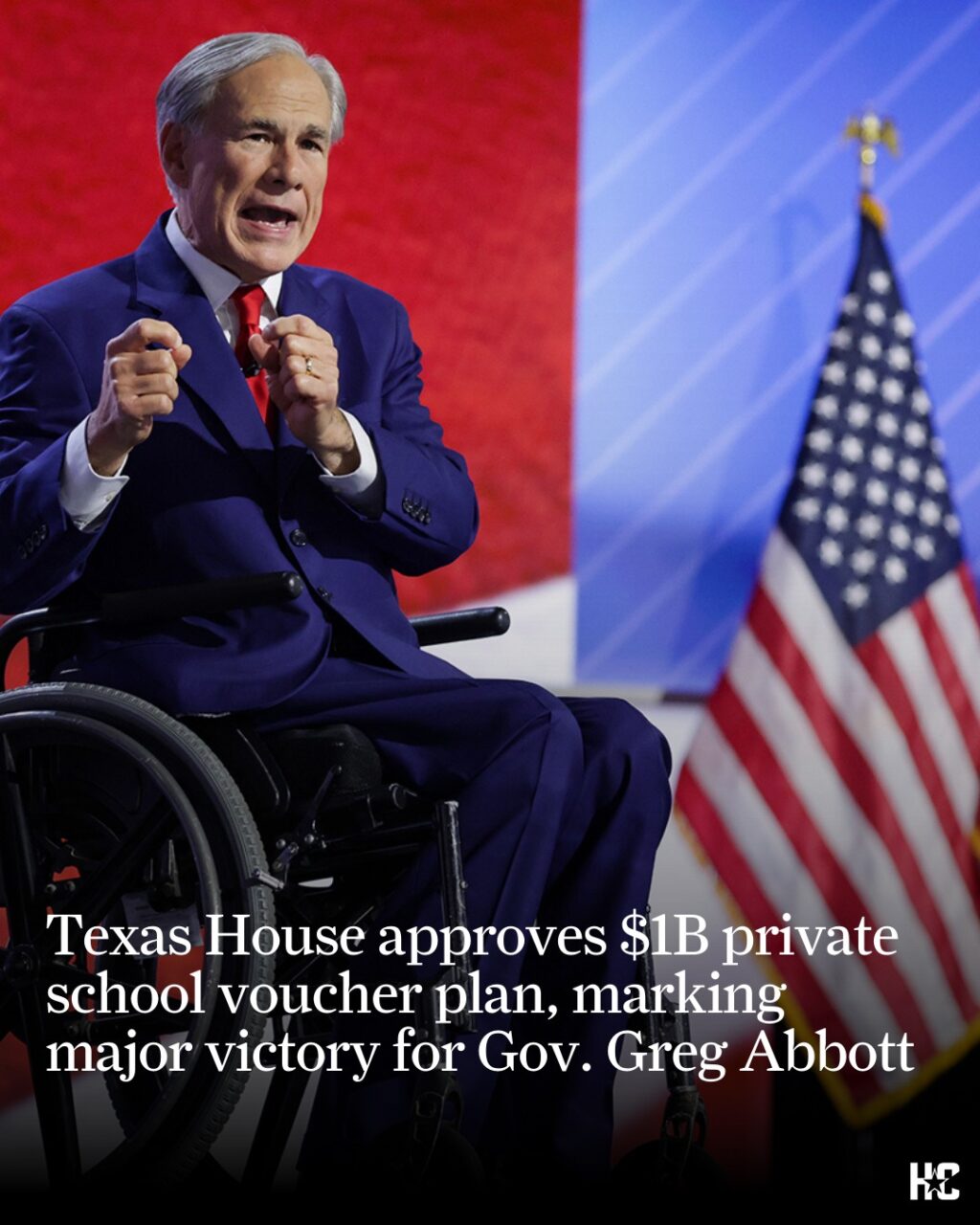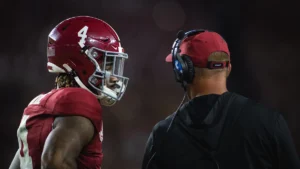
A comprehensive school voucher scheme was approved by the Texas House early Thursday, agreeing to provide $1 billion in taxpayer funds to families for private, frequently religious education.
In a landmark and controversial move, the Texas House of Representatives passed a comprehensive school voucher bill early Thursday morning, agreeing to allocate $1 billion in taxpayer funds toward a program that will allow families to send their children to private — and often religious — schools. The vote marks a major victory for Republican Governor Greg Abbott, who has made school choice a top legislative priority, but it also signals a growing divide over public education policy in one of the nation’s most populous states.
The measure passed by a narrow margin, following marathon debate that stretched late into the night and revealed deep ideological splits not just between Democrats and Republicans, but also within the GOP itself. If enacted into law, the plan would create one of the largest school voucher systems in the country, potentially affecting the educational paths of tens of thousands of Texas students.
The newly approved legislation establishes what is known as an “Education Savings Account” (ESA) program. Under this initiative, eligible families will receive up to $10,500 per child annually to use toward private school tuition, textbooks, tutoring, special education services, and other approved educational expenses. Families who opt out of the public school system could receive this money directly from the state, funded by general tax revenues.
Participation is expected to be open initially to students with disabilities, students from low-income households, and those attending schools rated as underperforming by the Texas Education Agency. However, critics worry the eligibility criteria could quickly expand, leading to broader and more permanent diversion of funds from public schools.
The vote in the Texas House came after months of political wrangling and failed attempts in past legislative sessions. Although the Texas Senate, more closely aligned with Governor Abbott, had passed similar proposals before, the House had consistently blocked them, largely due to opposition from rural Republicans concerned about the impact on small-town public schools that serve as both educational institutions and community centers.
This time, however, a combination of aggressive lobbying by pro-voucher groups, strategic deal-making, and political pressure from Governor Abbott turned the tide. In recent months, Abbott toured the state advocating for parental choice in education, often invoking biblical values and constitutional freedom. He also endorsed primary challengers against Republican lawmakers who opposed school vouchers, a tactic that appeared to yield results.
“I made a promise to Texas families that I would fight for their right to choose the best education for their children,” Abbott said in a statement after the vote. “Today’s vote is a huge win for educational freedom and a brighter future for Texas students.”
One of the most contentious aspects of the bill is its provision for public dollars to flow to religious schools. Although the legislation includes language meant to prevent discrimination and maintain some degree of accountability, opponents argue that funneling taxpayer money into faith-based education violates the principle of church-state separation.
“There is no oversight mechanism that ensures these funds will be used responsibly,” said State Rep. Gina Hinojosa, a Democrat from Austin and former school board member. “We’re sending taxpayer dollars to private institutions that can choose who they accept, discriminate based on religion, and are not bound by the same academic standards.”
Legal experts are already predicting court challenges, especially if the voucher funds are used for religious instruction or schools that exclude students based on gender identity, disability, or faith. In a nation where legal precedents on public funding of religious education are still evolving, Texas may soon find itself at the center of a constitutional battle.
Despite the win for Abbott and voucher supporters, the vote did not come without consequences for Republican unity. Several GOP representatives from rural areas broke ranks and voted against the measure, warning that it would siphon crucial resources away from already struggling public school systems.
“Our public schools are the lifeblood of our communities,” said Rep. Travis Clardy, a Republican from Nacogdoches. “They’re where we gather for Friday night football, where we hold town meetings, and where our children learn not just reading and math, but also civic duty. This bill doesn’t empower parents — it endangers public education in districts like mine.”
To win over skeptical legislators, amendments were added promising additional funding for public schools, teacher pay raises, and transportation upgrades. Still, critics labeled those provisions as “sweeteners” meant to disguise the harm the bill could do long-term.
Education advocacy groups were quick to condemn the vote, calling it a betrayal of Texas schoolchildren and teachers.
“This is a massive transfer of public funds to private entities with little transparency or oversight,” said Zeph Capo, president of the Texas American Federation of Teachers. “It’s a false promise of choice that ultimately benefits the wealthy and well-connected while leaving behind the vast majority of students.”
Proponents of the measure argue that the program offers an escape route for families stuck in failing schools, particularly in urban and underserved areas. They frame the initiative as a civil rights issue — empowering parents to choose a better educational fit for their children.
“There is no one-size-fits-all approach to education,” said Rep. Brian Harrison, a leading Republican advocate for the bill. “The state should not trap students in underperforming schools just because of their ZIP code. This bill provides a lifeline.”
Several parents and advocacy groups testified in support of the legislation, sharing stories of children who had thrived after leaving public school environments that were unsafe or unsupportive of their needs.
“We sacrificed everything to get our son into a private school where his dyslexia could be properly addressed,” said Dallas resident Kimberly Loya. “This bill will help families like mine who want the best for their kids but don’t have the financial means.”
According to legislative estimates, the voucher program could serve up to 95,000 students in its first year, with costs projected at $1 billion. Lawmakers have set aside funding for a limited rollout, but many believe that once the infrastructure is in place, the program will expand rapidly.
The Texas Education Agency, meanwhile, has warned that large-scale student withdrawals from public schools could lead to funding shortfalls, staff reductions, and school closures — especially in rural or economically disadvantaged districts.
Public school funding in Texas is tied to student attendance, meaning each student who leaves takes with them a portion of the school’s financial resources. That dynamic, critics say, creates a zero-sum game in which gains for private schools come at a direct cost to public institutions.
Texas is not the first state to adopt a school voucher or ESA-style system, but its size and influence make this vote particularly significant. If the program proves successful — or politically popular — it could inspire similar pushes in other red states or serve as a template for national proposals from Republican presidential candidates.
Education Secretary Miguel Cardona criticized the development, saying the federal government remains committed to strengthening public education rather than defunding it.
“Public dollars should stay in public schools,” Cardona said in a statement. “We need to invest in our teachers, our classrooms, and our communities — not divert taxpayer money to unaccountable private schools.”
Now that the bill has cleared the House, it will return to the Senate for reconciliation with its own version. Given strong Senate support, the final legislation is expected to pass and reach Governor Abbott’s desk within weeks.
Still, the fight is far from over. Lawsuits are almost certain, and public backlash could shape future elections, particularly in battleground districts. Teacher unions, school boards, and civil rights organizations are already mobilizing to challenge the law in court and at the ballot box.
“This bill might be signed into law,” said Rep. Hinojosa, “but the people of Texas have not had their final say.”
The Texas school voucher bill represents a turning point in the ongoing debate over public education, school choice, and the role of government in shaping educational access. Supporters view it as a bold step toward parental empowerment and student freedom, while critics see it as a dangerous experiment that could undermine public education as a public good.
With $1 billion on the line and tens of thousands of students poised to be affected, the consequences of Thursday’s vote will reverberate far beyond the Lone Star State — potentially reshaping American education for generations to come.





